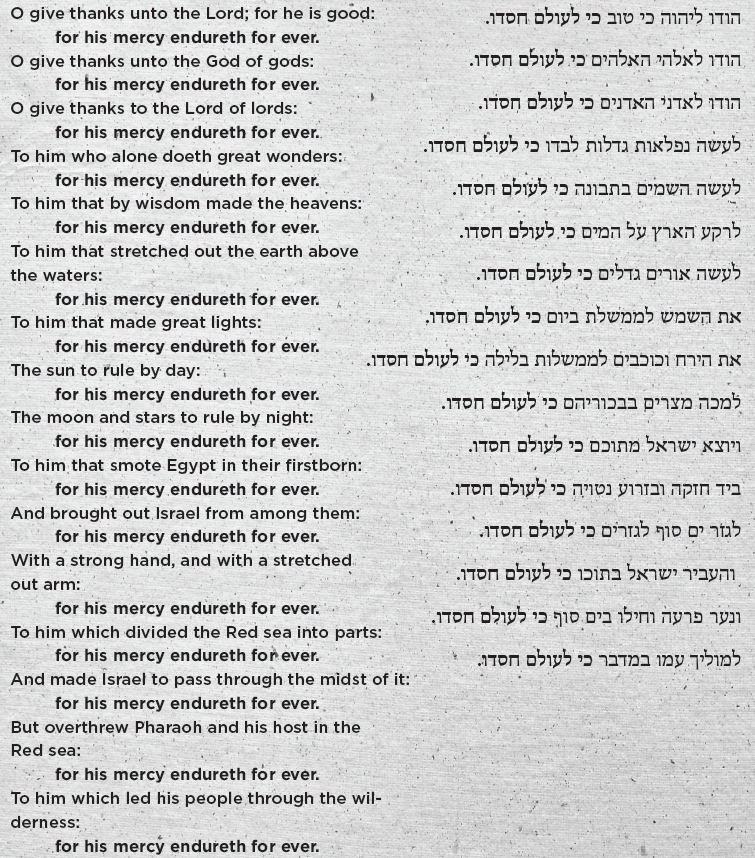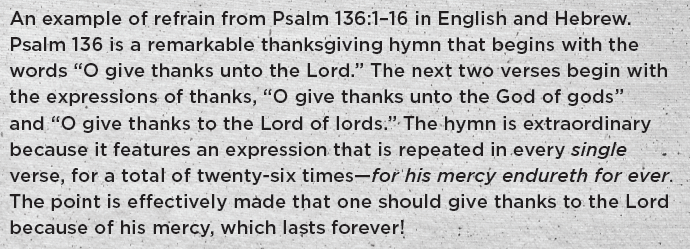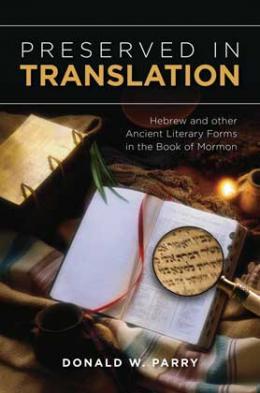Refrain
Donald W. Perry, “Refrain,” in Preserved in Translation: Hebrew and Other Ancient Literary Forms in the Book of Mormon (Provo, UT: Religious Studies Center, Brigham Young University; Salt Lake City: Deseret Book), 51‒56.
"but his hand is stretched out still" (2 Nephi 15:25)
A refrain is a recurring identical expression in a hymn, psalm, or prose passage.[1] Latter-day Saints will readily recognize various refrains in Hymns of The Church of Jesus Christ of Latter-day Saints—for example the chorus “We’ll sing and we’ll shout with the armies of heaven” in the hymn “The Spirit of God” and the eight repetitions of “Come to Zion, come to Zion” in the hymn “Israel, Israel, God Is Calling.”
Occurring at the beginning, middle, or end of passages, refrains serve multiple purposes. They can give prominence to doctrines or truths (see first example below); invite participation by the audience (second example below); or emphasize the repeated words, effectively setting them apart from other expressions in the passage (third example below).


The Old Testament contains multiple instances of refrains. Here are two examples:
O give thanks unto the Lord; for he is good:
because his mercy endureth for ever.
Let Israel now say, that his mercy endureth for ever.
Let the house of Aaron now say, that his mercy endureth for ever.
Let them now that fear the Lord say, that his mercy endureth for ever. (Psalm 118:1–4)
Let the people praise thee, O God;
let all the people praise thee.
O let the nations be glad and sing for joy:
for thou shalt judge the people righteously,
and govern the nations upon earth. Selah.
Let the people praise thee, O God;
let all the people praise thee. (Psalm 67:3–5)
Some Old Testament refrains occur multiple times throughout a chapter or book. For example:
Yet have ye not returned unto me, saith the Lord is repeated five times in Amos 4 (see verses 6, 8, 9, 10, 11).
For his mercy endureth forever is found twenty-six times in Psalm 136 (at the end of every verse).
His hand is stretched out still occurs five times in Isaiah (5:25; 9:12, 17, 21; 10:4).
Turn us again, O God, and cause thy face to shine; and we shall be saved is repeated three times in Psalm 80 (verses 3, 7, 19).
How are the mighty fallen is used three times in 2 Samuel 1 (verses 19, 25, 27).
The Lord of hosts is with us: the God of Jacob is our refuge is found twice in Psalm 46 (verses 7, 11).
Like the writers of the Hebrew Bible, the Book of Mormon authors used refrains.[2] In his speech to the people of Zarahemla, Alma repeatedly asks, “Have you sufficiently retained in remembrance . . . ?”
And now behold, I say unto you, my brethren, you that belong to this church, have you sufficiently retained in remembrance the captivity of your fathers?
Yea, and have you sufficiently retained in remembrance his mercy and long-suffering towards them? And moreover, have ye sufficiently retained in remembrance that he has delivered their souls from hell? (Alma 5:6)
In an epistle to Pahoran, the Nephites’ chief governor, Moroni, whose armies were in desperate need of provisions and reinforcements from the government, wrote, “Have ye forgotten . . . ?” three times:
Have ye forgotten the commandments of the Lord your God?
Yea, have ye forgotten the captivity of our fathers?
Have ye forgotten the many times we have been delivered out of the hands of our enemies? (Alma 60:20)
After atmospheric upheavals and destructive forces of nature had destroyed several Nephite cities following the crucifixion of Christ, survivors of the destruction heard the Savior declare, “Wo, wo, wo unto this people.” As Jesus continued to speak, he repeated four times a close variation of the words “To hide their wickedness and abominations from before my face, that the blood of the prophets and the saints should not come up any more unto me against them” (see 3 Nephi 9:5, 7, 8, 11).
Here are other examples of refrain in the Book of Mormon:
there was silence in the land for the space of many hours (twice in 3 Nephi 10:1–2)
out of the mouth of the Jew (three times in 1 Nephi 14:23)
daughters of Ishmael to wife (three times in 1 Nephi 16:7)
the law of Moses (four times in Mosiah 12:31–32)
as never had been known in all the land (twice in 3 Nephi 8:5–7)
like unto a dish (five times in Ether 2:17)
did go up to battle against the Lamanites (twice in Mosiah 10:10)
King Benjamin’s words, revealed by God’s angel (see Mosiah 3:2; 4:1), include the refrain “Both in heaven and in earth”:
Believe in God;
believe that he is,
and that he created all things,
both in heaven and in earth;
believe that he has all wisdom,
and all power,
both in heaven and in earth. (Mosiah 4:9)
This elegant refrain emphasizes that God’s creative activities were not limited to our planet, for “he created all things,” both in heaven and in earth. Moreover, his almighty power and wisdom are not limited either, for he has all wisdom and he possesses all power, both in heaven and in earth.
Notes
[1] For a brief treatment of refrain in the Bible, see Bullinger, Figures of Speech Used in the Bible, 343–44.
[2] On the topic of repetition in the Book of Mormon (with several examples), including refrains, consult Parry, Poetic Parallelisms in the Book of Mormon, xxxiv–xliv.
